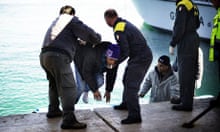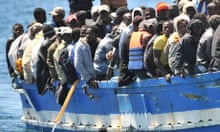Libyan authorities
Colonel Gaddafi's threat to unleash an "unprecedented wave of illegal immigration into southern Europe" in response to Nato's air strikes against him helped transform some of Africa's most vulnerable people into a political football. Libya also failed to mount any rescue attempt, states the report, adding "even in times of war, a state has the responsibility for the safety of civilians, be this on land or at sea. Libya can therefore not be absolved of all responsibility on this matter."
The smugglers
The boat's survivors recall having their basic provisions taken away from them on boarding the tiny rubber dinghy so that the people smugglers could squeeze more people in and maximise their profits. "The smugglers were totally reckless with regard to the lives of their cargo. To make money they overloaded the boat, they took away food and water, they did not provide sufficient fuel and they did not provide adequate means of communication in case of distress," concludes the report.
The Italian coastguard
Italy's Maritime Rescue Co-ordination Centre in Rome was responsible for issuing the distress calls, but as the migrant boat was drifting in a section of the Mediterranean covered by Libya's search and rescue zone, the Italians did not attempt a rescue themselves. The report argues that given the fact Libya was a war zone at the time and hence was obviously not fulfilling its maritime rescue obligations, more should have been done from Rome to directly help the migrants. "The boat in distress was left floating in a responsibility vacuum," it explains.
Nato
The military alliance was conducting operations in Libya at the time of the incident and at least one if its warships was in the immediate vicinity of the migrant boat. "Nato declared the region a military zone under its control, but failed to react to the distress calls sent out by Rome Maritime Rescue Co-ordination Centre," states the report, which also condemns the agency for "inconsistent" answers to key questions about its inaction and for not fully co-operating with the Council of Europe inquiry.
Individual navies
Two warships were close enough to the migrant boat to attempt a rescue, namely the Méndez Núñez (Spanish but under Nato command at the time) and the Borsini (Italian). Both vessels should have received the emergency distress messages broadcast from Rome but neither attempted to help. "The flag states of these two ships failed to rescue the people, although their vessels were close by," states the report. A Cypriot supply vessel, the Sea Cheetah, is also believed to have been in the migrant boat's vicinity at the time.
Commercial fishing vessels
Several fishing trawlers in the Mediterranean must have picked up the distress signals and survivors claim that two such vessels, one Italian and one Tunisian, came into direct contact with their boat. But neither attempted a rescue or alerted the coastguard. The report notes that European policies regarding irregular migration have made some fishing captains reluctant to summon help for migrants, adding: "If they had done this, many lives could have been saved."
The UN and the international community
Libya has always been a major departing point for migrants attempting to reach Europe, and the report concludes that when Operation Unified Protector was launched in March 2011 against the Gaddafi regime, planning should have been in place to deal with the inevitable spike in irregular migration that would follow. An Italian naval official is quoted in the report as saying: "Before starting a war, you have to know: where do you put the prisoners? Where do you put the dead? What do you do with the refugees?" The report suggests that the final part of that question was never properly considered, with fatal consequences.




